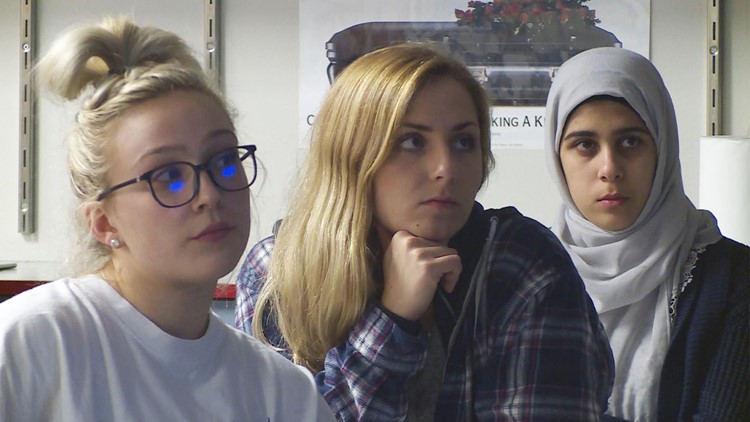Teens, some who lost classmates or friends to suicide, are part of a shift in how we talk about suicide, a topic often cloaked in shame. They’re confronting the public health issue and helping their classmates overcome the symptoms that so many have difficulty discussing.
“I feel like if I can talk about it comfortably, then someone I’m talking to can feel like they can open up,” said John Bush, 17, a senior at The Overlake School in Redmond.
Bush was among dozens of high school and college students who participated in the Day of Hope, an event organized by Forefront Suicide Prevention, a University of Washington office working to bolster suicide prevention efforts in schools.
Dozens of students gathered at UW for a show-and-tell of sorts, of what they’re doing in their communities to help identify and address mental health challenges among their peers.
“There’s so much potential being lost because someone feels hopeless for an instant in their life,” said Michael Coombes, 18, who attends Muckleshoot Tribal School in Auburn.
At Mount Si High School in Snoqualmie, Makenzie Davis and Lilly Strong are part of a team of students who teach suicide prevention lessons in health classes.
“How did it feel to say the word suicide, was it kind of awkward?” Davis asked the class.
They tell their peers how to spot symptoms, and what to say.
“Mikaela, sometimes when people are stressed anxious or fed up about school, they are thinking about suicide, are you thinking about suicide?” one student asked another during an exercise.
This is a new effort meant to transform a school’s conversations. Experts at Forefront Suicide Prevention designed the program, which now has a footprint in 29 Washington high schools.
“Over the summer I was at the mall and a senior came up to me and was like, ‘Hey, you’re the person that taught that suicide prevention program, that has actually helped me, I have helped my friend through his struggles, and he thought about suicide, but I got him help,’ and I thought that was extremely powerful,” Strong said.
After the bell rings for the day, teens like Alex Li, 18, are on standby, ready to answer calls and texts from other young people who are grappling with their emotions.
“I can definitely speak for myself when I say I would definitely feel more comfortable talking about something personal with another teenager than an adult,” Li said.
The TeenLink call center, run by the Crisis Clinic, is one of just a handful in the country where adolescents, not adults, pick up the phones when young people make the call for help.
Last year, teen volunteers answered more than 3,700 calls and chats from other teens seeking help. The center is staffed 365 days a year, even on holidays.
Li joined TeenLink after some friends and classmates told him about their struggles. He hopes to help others overcome anxiety, by making sure they’re in a safe place, and directing them to counseling and other help.
“I distinctly remember every single time that I’ve been thanked, the chat shows emoticons, so every time I get a smiley face at the end of a chat, it sticks with me,” Li said.
Teens are also helping lead efforts to expand mental health resources in Washington.
Earlier this year, Elsa Marsh, a Mount Si sophomore, and some of her classmates met with lawmakers in Olympia, who are considering a new requirement that the state develops an online training program to help educators recognize and respond to behavioral distress among students.
Marsh lost one of her childhood friends to suicide when she was 13.
“This has been a really healing way to take something like that and put it into something better,” she said.
Back at the UW Day of Hope, students brainstormed new ways to improve mental health, amid the stresses of a busy school day. At The Overlake School in Redmond, math classes are testing a “health pass” which allows students to get out of a math homework assignment, no questions asked. Sometimes students stress out when they have a large workload, and that one extra hurdle can seem like too much.
“It’s time for us to stand up and play our part in helping the people who are our family, live in our community,” said Natalie Hakim, 16, who attends Shorecrest High School.
The TeenLink helpline is: 866-833-6546
The National Suicide Prevention Helpline is: 800-273-8255



